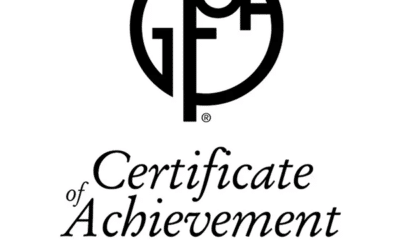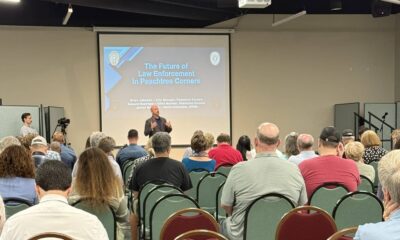Business
Capitalist Sage: How Barter Can Help Small Business During COVID19- Pandemic [Podcast]
Published
5 years agoon
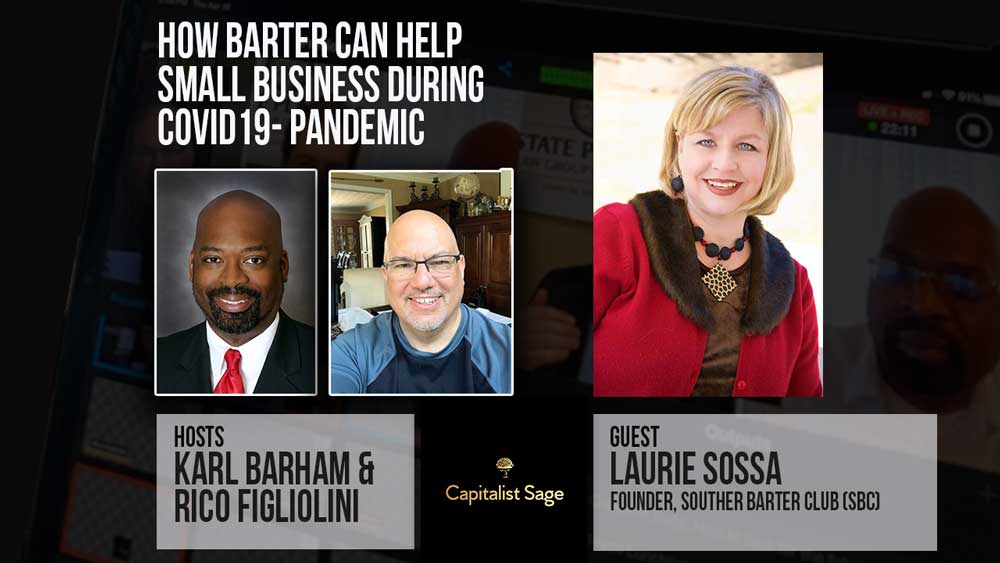
An age-old tradition of bartering between businesses is still alive and well thanks to the Southern Barter Club and founder Laurie Sossa, our guest on today’s episode of the Capitalist Sage. Learn how your business can barter and the benefits of working with SBC. Join Rico Figliolini and Karl Barham as they chat with Laurie about how SBC works, the benefits of barter, and exactly how to make bartering a part of your business.
Resources:
SBC Website: SouthernBarterClub.com
Global Website: SBCGlobalBarter.com
Phone Number: 678-547-0900
“We are here for the community. So, you know this is a time, more than ever, that we have to really just be a resource to one another… So definitely, what I’m hoping that everybody gets out of this more than anything is even if they don’t work with Southern Barter club, start slowly even with just leveraging what you have, your time, your resources, your assets, and don’t be afraid to approach another business owner you want to do business with. That’s your neighbor or colleague or someone you’ve always worked with… So if anything, we hope there’s awareness to bartering and trading.”
Laurie Sossa
Show Notes:
[00:00:30] – Intro
[00:03:17] – Laurie’s History with Barter
[00:05:42] – How Barter Works
[00:07:09] – Typical Trades
[00:14:29] – Businesses That Could Benefit
[00:18:28] – Pricing Concerns
[00:26:41] – Why Doesn’t Everyone Barter?
[00:29:23] – Business Expenses
[00:32:13] – Closing

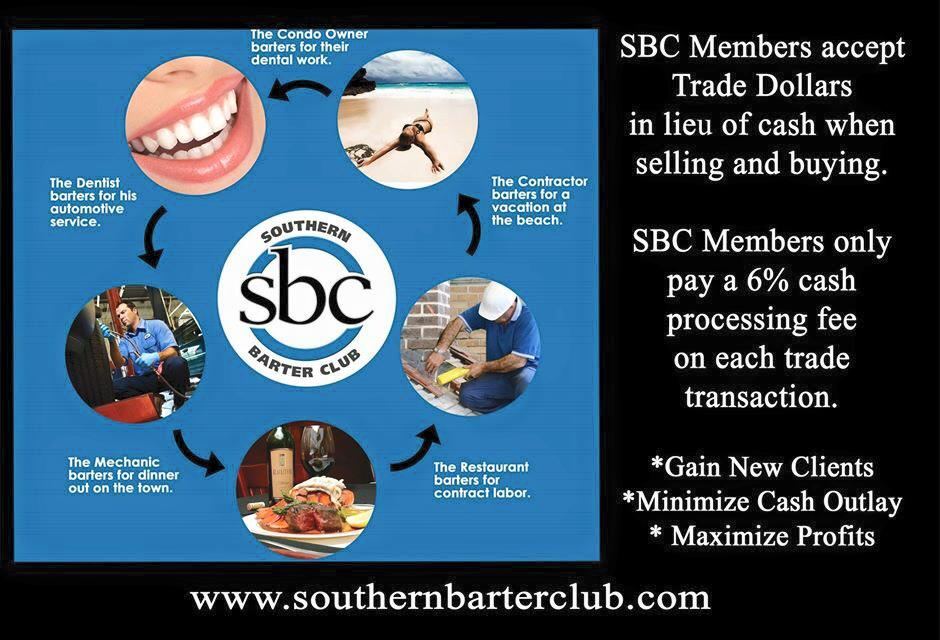
Podcast Transcript
Karl: [00:00:30] Welcome to the Capitalist Sage Podcast. We’re here to bring you advice and tips from seasoned pros and experts to help you improve your business. I’m Karl Barham with Transworld Business Advisors, and my co host is Rico Figliolini with Mighty Rockets Digital Marketing and the publisher of the Peachtree Corners Magazine. Hey Rico, how are you doing today?
Rico: [00:00:47] It’s a beautiful day, Karl. Glad to be out here.
Karl: [00:00:50] Absolutely. Things are opening up. And little by little, I see activity happening throughout. So, we’re here doing this virtually, as we continue with the COVID-19 pandemic, but today… Innovative ways for, that folks are handling business during the pandemic. Let’s start off with our sponsors Rico.
Rico: [00:01:15] Sure. Well, let me introduce the sponsor, our lead sponsor in the family of podcasts, is Hargray Fiber. They’re a very large Southeastern based fiber cable company that provides solutions both to small businesses and large enterprise businesses. When it comes to internet connection and working online, teleworking and providing the bandwidth as well as fiber to these companies to be able to do what needs to be done across the Southeast. They’re not your cable guy, they are right in your community. They’re involved in the community and they’re there in quick notice to be able to help you do what you need to do. They’ve upscaled to be able to meet the challenges during this pandemic. So great place. They are offering all sorts of tools for free to be able to do online work, they’re HargrayFiber.com so this is, see how things can work for you.
Karl: [00:02:13] That’s fabulous. Well, today we’ve got an interesting topic. We wanted to, a couple of weeks ago, Rico and I were having a conversation as we were talking about how business people are figuring out ways to navigate some of the economic restrictions that have been put on businesses. And the topic of Barter came up. And for those of you that may not know much about Barter throughout the history and the present of it, we’ve got a fabulous guest here today. Laurie Sossa is the founder of the Southern Barter Club, and today we’re honored to have her on to help educate us a little bit around how Barter has been used and is being used by business owners to help them, not just today, during these economic times, but also how we can help people in their business, in particular, conserve cashflow. Hi, Laurie, how are you doing today?
Laurie: [00:03:11] Hey, good afternoon, and I’m doing well as well as can be. Thank you for having me as a guest today.
Karl: [00:03:17] No, we appreciate it. Why don’t we jump right in and start off by telling us a little bit about yourself and what led you down the path to discover and Barter as a business.
Laurie: [00:03:30] Well, my background is marketing, research and advertising. And we’ve worked with businesses that had products and services, and we were involved from the
beginning to the point where we helped them with marketing implications and recommendations and product launches and distribution. And we realized early on, especially manufacturer, everybody has their own costs of doing business. So there’s a lot of opportunity for leveraging. And so we realized early on that, you know, especially a business that’s just launching. That they could actually provide a marketing budget and expand it because if they leveraged something that they had the ability to earn at their costs of doing business, but yield the spending in the value of whole retail, it’s really a game changer. So early on, this is back in the nineties, we facilitated a lot of direct one-on-one trading, and I love the opportunity of being a resource to entrepreneurs and startups. Creating our own little ecosystem. But what we did realize is that there’s always a challenge. Have either, I don’t know if either of you or anyone you know, has ever done some type of barter. So that’s, that’s an interesting question because sometimes there’s a challenge of two people being interested in what the other person has to have to begin with, right? And also the value of being there. And so when we started seeing that, that’s when I decided, you know, I want to be a resource to entrepreneurs and to, you know, businesses, nonprofits that are cash strapped and take out of the equation, we call it the incidence of coincidence. You know, that’s when people actually have something that each other wants and that the value is there. And so we created our very own barter system, and 11 years later, it’s strong. And it’s not just here in the Southeast and Atlanta, but we actually have, several thousand throughout the state of Georgia and several thousand throughout the country. And we have reciprocation of 50,000 businesses around the world, that by itself…
Karl: [00:05:42] Wow. So I’m curious, how does Barter work typically? I’m a business owner and I need something in my business.
Laurie: [00:05:54] Well, the starting point is that we actually have what’s called a trade dollar, and it’s equivalent to what a US dollar is. And it is taxable. So in other words, the IRS sees the value of it. Our role as a barter organization and in the industry we’re called a trade exchange, by the way, the official terms in this $12 billion industry. And so we are the third party record keeper. So we manage all the debits, all the credits, and we utilize a trade dollar equivalent to what a cash dollar is. So a member is any type of business that has goods, services, resources, any type of underutilized asset that they otherwise don’t have a buyer for the cash. Or they have downtime and seasons and maybe not budgets but full cash. So it makes sense for them to bring it to a trade thing, such as SBC, Southern Barter Club where we’ll map the buyers and the sellers. So simply the people who participate are business owners. They’ve identified what services, resources, or assets that they want to make available and accept another form of currency in lieu of cash, in trade dollars.
Karl: [00:07:09] Got it. At a time like this where folks have been challenged with finding revenues and customers, can you give me an example of a typical trade that might happen?
Laurie: [00:07:25] Absolutely. Well for starters, we have what’s called a online platform. So just like all of us use day to day online banking, so you’re not going to go through the drive through right? Of the dry cleaners, or a fast food if, unless you’ve checked your balance right in your
online banking account. So we haven’t, this is a little house on an online sophisticated, but very easy to use platform where members keep up with their trade dollars that they’ve earned. So the members simply just move past except what’s called these trade dollars. And they bank them and they may have something very specific in mind that they want to spend them on. Or they just bank them knowing that when the rainy day comes such as right now, unfortunately during this pandemic, that they’ve already been earning and building up and have this alternative currency in their account that they can tap into to offset spending cash to help grow their business. I did want to ask if we could put the slide up to show the model of how it works.
Karl: [00:08:28] Okay.
Laurie: [00:08:30] Okay, wonderful. So with that, how it works, it shows the SBC in the middle, so that’s our currency equivalent to one cash dollar is the trade dollar. And so a dentist can be contacted by SBC broker and tell the dentist, we have an automotive company that does car repairs and they want to be able to send one of their employees to get some dental work. And so the dentist may say, Oh, well, I don’t have any need. My son owns an auto repair service, so I don’t have any need for auto repair. That doesn’t end there. What he does say is, but I will accept your trade dollars. And so the automobile company now has to provide automobile repair maybe to the hotel owner or maybe to a restaurant owner, somebody else in the network that would want and need auto repair, and he accepts in lieu of cash, for the labor only not the product. He accepts in lieu of cash, trade dollars for the labor, puts it in this online account. Let’s say as an example he earned 1,000 trade dollars for labor on a transmission, let’s say for the restaurant owner. The restaurant owner already earned their trade dollars by letting the landscaper, the plumber and the hairstylist eat at their restaurants and in lieu of cash accepted trade dollars. So they’ve already banked their trades dollars. So now the restaurant owner goes to the automobile shop, thanks to SBCs directory and brokering services and says, we’d like to get $1,000 worth of transmission repair. Not the actual, you know, transmission, but the labor and the services. And so they’ve accept whats called trade dollars. For facilitating that SBC charges a 6% cash transaction fee. So now the restaurant has provided a thousand dollars worth of dining. But at a core restaurant their cost of doing business is maybe 28 to 30 cents on the dollar. I know you know that as a business advisor and a business coach and business consultant, everybody has their own cost of doing business, but the restaurant, it’s 28 cents to 30 cents on the dollar. So for them to provide $1,000 of gift certificates and $20 increments, that’s could be resold over time. In reality to fulfill it, it’s only going to cost them tops $300. Okay. But at the same time, they just say, thank you, SBC for bringing me that thousand dollars sale. Here’s your $60 cash fee processing fees 6% okay. And now they earned that 1,000 trade dollars in their virtual account. It cost them $60. In hard costs, it may have cost them over time to fulfill each time the person was using the gift certificate. It perhaps cost them that $300 let’s say for food. You know, but other than that, what’s happening is the pasta is boiling, right? The water is on, in the pot, the pasta is boiling. The lights and electricity are on. The waitstaff is there. We don’t want them twiddling their thumbs. So if we could identify for the restaurant certain times of the week, certain times of the month, that is good. Monday nights, it’s dead. Monday through Thursday during lunchtime, we don’t have a lunch crowd. We would like to
accept those certificates during those times. But we really don’t want to barter on Friday, Saturday, Sunday cause we’re jam packed, our tables are filled. But we would welcome, you know, not having empty tables Monday through Thursday. And so we’ll take barter for currency. And so there’s a lot of things happening there in bartering. They earned more power bar currency. Now they have a thousand dollars they wouldn’t have had otherwise of spending power, not cash, but barter trade dollars. But now they also have filled, you know, open tables in the restaurant. Their wait staff is going to earn their 20% cash tip because it’s tipping as always. Now, here’s the best part. Let’s say it was an attorney that purchased a gift certificate and took one of their clients to the restaurant. Well, we know what happens when there’s a job well done and a fantastic experience, right? They’re going to come back. They’re going to remember the great experience. And so what happens is word of mouth advertising naturally just happens. And the person or the business contact that the attorney had brought in for the meal, they don’t know if it’s participating in a barter system. They don’t know was paid with alternative currency. They just know that they were taken by their attorney to this restaurant and it was a great experience. And they’re going to come back. And so barter, at the end of the day, does help with word of mouth, advertising, marketing, branding, filling, you know, empty tables, helping get tips, you know, and some business for the staff that’s on hand, and filling their barter account with spending power. So now they’ve earned, and now they say, my employee needs dental work, or my employee needs a new transmission. So I’m going to spend that thousand dollars I just earned, and I’m going to go ahead and maybe go to the dentist or maybe go to the automobile company and get the repair done and use the barter dollars. So let’s say it’s only $500 in barter, simply a 6% transaction fee, $30 in cash, $500 in dental work, or the automobile repair. And now they still have left over $500 from their initial earning of the thousand barter dollars.
Karl: [00:14:11] So I’ve got a question for businesses today…
Laurie: [00:14:23] So how are businesses today using the barter during pandemic?
Karl: [00:14:29] What types of businesses? Services? What types of businesses would most benefit from this?
Laurie: [00:14:35] We have a directory that literally is A to Z. So anything from an art gallery, accommodations, acupuncturist, all the way to theater tickets, yoga, zoo tickets. So it’s literally an A to Z directory. Every business has capacity. So if there’s a dentist or a plastic surgeon or an eyelash extension company, massage therapist that has appointment times, if they’re not at full capacity, you know, if they have an eight hour day that they’re open and they have time slots that are empty, they can simply either call or alert, SBC Wednesdays pretty low, in us filling our bookings. Can you please send a blast out to your network and let them know that we’ll accept some clients and accept the barter currency. And sometimes it may not be that they reached out to us and that’s what our businesses love. It may be that we answer the phone and it may be the plumber who all along for the past several years, it’s his business model. He’ll, except when he has downtime at his convenience, when it works for him, you know, clients we wouldn’t have
had otherwise. Yes, I’ll perform the plumming. Banks online, this barter currency, and uses it as a spending power for when the needs come up. So it may be six months later when he realizes, Oh, you know, I need to go to the dentist, or, Oh, I need to, you know, reward my employees as a retention tool and give them tickets to a concert, or send a gift basket to a client. So this actually becomes a spending account. So it could become an account for business expenses. Some of our clients actually have stretched their marketing dollars, and have used their barter funds that they have received and been building up. And when it comes to, you know, some type of a marketing campaign, they will tap into their, their barter currency, get on a billboard without paying cash, use radio stations.
Karl: [00:16:31] I wonder if that’s something that folks can do today. If they don’t have the capacity, whether it’s a restaurant or massage parlour, in exchange currency for future services, or gift certificates to employees. They may be able to get marketing help, or accounting help from somebody else. Which would lower an expense that they would normally have for that.
Laurie: [00:16:59] Absolutely. It absolutely, it really is just business as usual, you know, provide your services, but just accept the help of an agency that is going to drum up the business for you. And it’s a different form of currency. You know, more than ever. We, I’ve never seen business like this before. I’ve been, we’ve owned Southern Barter Club, SBC Global Barter for 11 years. We’ve been running on seven days with brokering our clients. So we have, with the initial outbreak now things are the supply chains, a little bit improved, but we were getting panicked phone calls where, you know, we need hand sanitizer, we need free, you know, toilet paper and we need masks, facial masks, you know? You know, all these types of things that, because they would go to their supermarket, you know, and the shelves were bare. Okay. And they’d have to wait. And so we have done thousands, probably 10, 20,000 or more, you know, worth of transactions of our clients that we’re picking up and buying un-inflated prices. Very necessary, supplies. Hand sanitizer, facial masks, toilet paper, paper towels, things like that. That they otherwise maybe couldn’t even tap into back in March, by the way.
Rico: [00:18:28] Let me ask you, since you brought that up, about the, the price, because that’s always been a concern of mine with when it comes to barter. Two things, how do you sort of vet the members to make sure that they’re doing the right thing. And how do you make sure that these members, you know, if it’s a $1,400 transmission job, let’s say, that they don’t say it’s a $2,000 transmission job. Because I’ve seen that in other organizations sometimes where the price doesn’t make sense, and it’s still cheaper to go pay cash for it. So how do you protect the membership from those types of things that might happen.
Laurie: [00:19:08] That’s a good concern. And unfortunately, the reality is that there are people who attempt to do that. People are who they are in the cash world. If that’s who they are, and that’s how they do business, they’re that way in the barter world. What we do is we establish ethics where it’s according to the fair MSRP. So if there’s a business out there and you know, their price on the menu is established price on the menu. When you go with dine in that restaurant, that’s the established price. But if you’re going to hire a contractor. In the cash world,
you’re going to hire a contractor and they’re going to come to your home or your business and gives you a price to paint your home, and they tell you it’s $2,000. It wouldn’t be really prudent and really just, you wouldn’t be a good consumer if the first person you just called randomly, you’re going to say, yes, I’m going to pay you $2,000 cash to come paint my house. So there’s an obligation that goes back on the buyer to do their due diligence themselves. We’re a directory, just like the yellow pages has always been for those of us who remember the yellow pages, it was delivered. So we house the directory and we do all we can. We do actually employ, since that’s my background, mystery shopping. So if somebody calls with a concern that like this dry cleaner, this happened actually, we had a dry cleaner in Buckhead that was for years clients of ours. And everybody was happy with their services, but it did take one client that out of there, for whatever reason, out of their little area that they, that they lived in, out by Toko Hills decided that they needed to go into Buckhead. And so they looked in the directory and they went to a dry cleaner in Buckhead. And they came back and they were astonished and they said, what? I’m paying, you know, such and such for my dry cleaning. And why is it so much more expensive there and they’re using the barter system? So we hear what our clients say and we don’t just leave it at that. So what we did was we sent a mystery shopper. So we sent someone who actually went in and they said, Oh, I’m new to the area and I’m going, you know, and I would like to be using for my husband’s shirts. You know, apples to apples, you know, what it was going to be was laundering and dry cleaning of shirts. And, you know, we’re interested in knowing what your prices are and I just wanted to introduce myself. Can you write it down for me? And it was right on his, he also happened to own a gym. And he had some, like trifles or whatever for the gym, can you write it down for me? And he wrote it right down on there. And we found out that the prices were exactly what the prices were. He was Buckhead rent, so the prices were a lot more expensive than the Toco Hills area where he was getting his shirts done. However, I do want to say that several years later, a different company, the same exact thing, a concern happened in Buckhead. And we would, we were actually, well maybe it’s the same thing. It’s Buckhead rent, but three different people brought it up. We sent somebody and sure enough, they had pricing written on the board, you know, behind the counter. And it was like 50 something cents more. And so they were changing the prices and we told them that he needed to do fair trading. And he had all the reasons why he felt justified. And we just said, well, we can’t bring you new clients. We’ll help you spend out your account and close your account. And that’s what we did. So when it’s brought to our attention, we don’t ignore it. But the only way that we can fix the problem is if it’s brought to our attention. So we have a rating system. So when you have done a transaction, finished a transaction at a rate, the person that you just traded with at one to five star. And you know, accountability is a big thing. Knowing that you know the person. I do want to give one other example. We had a Mexican restaurant in Lawrenceville, Gwinnett County that wanted to have the vestibule built and they had received cash prices because again, we always tell everybody. Don’t just go with the first price that somebody puts you in barter, like do your due diligence and get several quotes, you know? So if I’m going to get my house painted or I’m going to build a vestibule, I’m going to get at least three quotes. And if it’s too low? Hmm. Something to think about, right. If it’s too high, well, I don’t want to be taken advantage of. But if it’s right in the middle and it sounds right then that may be. And you have to take into other considerations is, are they using contractors? Are they using
employees? Do they have a warranty with their work? So this Mexican restaurant had, actually, picked up day labor and that’s how they wound up getting their, their vestibule built. So it was different people that were working on it different days, and there was no warranty. And it wasn’t apples to apples when they compared the price that was maybe double the price, but it was with an established company that had employees and it did have a warranty. So, we just have to put the responsibility back on the buyer. Just business as usual in cash business. I’m not going to just go with the first quote. I’m going to get two or three and be an informed consumer.
Rico: [00:24:21] And I like the fact that you have reviews on there and the star rating because transparency, right? Because everyone knows it’s not like, just it’s like there’s the company name attached to the account. So if there’s good transparency, so they’re getting a review and it’s a bad review, whoever is saying it is standing by it. If it’s a great review, they’re standing by it.
Laurie: [00:24:48] Absolutely. One of the things I did want to manage expectations, and I think it’s a simple, very simple illustration, but I think it really does hit home is, if anyone has ever gone into Macy’s as an example with their mindset, I want a size large, Navy Ralph Lauren sweater. Right? They can go into Macy’s or any retail store, and if they’re going to pay full retail, they’ll get a very big variety of sizes, brands, and available options, right? Different experience if I head over to the clearance rack. I still want the Navy blue, Ralph Lauren size large sweater, but it’s only $20 it’s discounted patch. And I’m looking on that rack and I see black, not blue, but then again, it’s$20, it’s on the clearance rack. I’m not paying a hundred retail or I see Calvin Klein, not Ralph Lauren, but it is Navy blue and large and it’s $20 so that’s how I like to manage expectations in our network is we are a clearing house. So it would be unreasonable to think that I’m going to get something on barter when cash is king and it will always be king. You know, it’s an incremental opportunity to hold onto your cash, minimize your cash outlay, and you’ve earned it the same way. So wouldn’t be fair for a hotel owner as an example to say, no, we’re not going to barter on 4th of July and let you book it six months in advance. They wait to the very last minute when they realize that otherwise goes unsold for cash because that becomes perishable, right?
Rico: [00:26:33] As long as you’re setting expectations, that makes sense. People should understand that.
Laurie: [00:26:38] Yes, absolutely.
Karl: [00:26:41] So I’ve got a question. What are the challenges of people? Why don’t more people do this nowadays? I mean, obviously cash, but what do you see as some of the reasons why people don’t find ways to barter more?
Laurie: [00:26:55] I think the biggest, the two biggest things is number one, not knowing that they even have the ability to do it within a structured professional setting. So, you know, somebody could say that, I want you to build me a website and I’ll give you haircuts. And
oftentimes they’ll go ahead and build a website and then the place goes out of business and they’re stuck without payment, you know. And they got the short end of the sick. It also could be the situation where they don’t need a haircut, their daughter owns a salon. So I think most of the time there’s a brick wall when it comes to barter, where they don’t, where most consumers and business owners don’t realize that everybody has capacity. Everybody has something that they really could leverage. Time, talent, resources, something that’s even sitting, collecting dust or locked up in a storage or basement. So even though we’re a barter network for businesses, everybody has their core business that they provide and something in there. Not everything, by the way, like I haven’t in Buckhead, we have a center that will do laser hair removal and tattoo removal and weight loss. But they’re very clear that they do a hundred percent barter. They list everything in the directory, and we will recommend those services on a hundred percent barter. So everybody has to provide something at a hundred percent barter. However, they don’t have to provide everything at a hundred percent barter. So they list that we do. If you go to my website, you’ll see we do Botox and other types of services, but we’re not going to do Juvederm and Botox on barter. Now, if we don’t have that otherwise available on barter, and someone says, Oh, I see that that’s what they do, but I want it on a hundred percent barter. We could let them know that look, anything else that they do on a hundred percent barter or take advantage of it, they’re playing by the rules because they offer all these things on a hundred percent barter. If we can’t source it for you on a hundred percent barter, you can make an offer and ask them, can I do it with 50% with my barter currency, and then at least compensate you since you didn’t enter this in your profile as an offering. Can I, you know, can you accept 50% in cash? And so that’s not our practice, but it does happen on occasion and we’re fine with that when they’re already offering something else on full barter.
Karl: [00:29:23] One of the things I think that I, that I think that I’m hearing, I want to highlight that business owners today that might be struggling with what fundamentally is demand for customers, but they have capacity. Is this something where they can at least for a period of time, offer up some of that excess capacity, bank up barter dollars that as things return to normal. They may back up how much, you know, their capacities are to fill up, but they have barter dollars that they can use to fulfill other expenses in their business. Is something like that possible?
Laurie: [00:30:02] Absolutely Karl. So right off the bat, anyone that needs help in whatever way, so they need clients that, you know, maybe they have their brick and mortar, that everything has always been done brick and mortar. Maybe it’s an, I don’t know, but let’s say it was a some type of a yoga exercise class and now they can’t do that okay? So if they were in the barter system, and they have no barter dollars, and they now realize, wow, I have to figure this out, I have to adapt and integrate a new way of doing business. So now we can say to them, well maybe you have something here where you can now offer your yoga classes online. So let me introduce you to a company that can build an app for you. Let me introduce you to a company. That could, you know, build your website or produce your videos for you. You know, and now advertising that you can have on the radio that’s saying that, you know, we have virtual yoga classes, and they could just cash out them and to have entrance to be able to, now, you know, all do this
together. I’m again, just thinking a little bit outside the box, trying to make it an example, but if she doesn’t have barter dollars she’s already earned, that’s okay. We at, during this pandemic, we’re giving lines of credit. So during this pandemic, she could now say, you know, if I need $5,000 SBC, we can give them a line of credit for $5,000 and how are they going to pay me back? Well, they’re doing virtual classes for yoga, then let us promote it. And if you have capacity for 12 people online to be on your yoga class and they’re paying you cash to be in that yoga class, can you take two people that will pay you in barter dollars? And we’ll fill that class up with the two people on barter. And then when things settle and to the new norm, and there’s other ways that she can earn the barter, we’ll help her come up with the ways of paying back, you know, that. And she could think outside the box and say, well, you know what? Yoga is my business that’s struggling. I need to get that up and running. But, you know, I also sell Mary Kay cosmetics. You know, I also, you know, can do tutoring. Like we’ll help them think outside the box and tap into and leverage resources.
Karl: [00:32:13] That’s fabulous. Well, we’re coming to the end of our time and I just wanted to ask if people have questions or wanted to learn more, how can they reach you?
Laurie: [00:32:24] So our website is SouthernBarterClub.com and SBCGlobalBarter.com. And so they could email us from there. Our office number is 678-547-0900. And so they can call, send a message and set up a complimentary consultation. And we are here for the community. So, you know, if this is a time, more than ever, that we have to really just be a resource to one another. We also, you know, I mentioned to you, we’ll give lines of credit, but we’re also, with the membership fee, we’re doing it at 50%, so it’s normally 299. But they said we had created a code called, CSage and yes, thank you. And so that’s 149 instead of the 299. So definitely, what I’m hoping that everybody gets out of this more than anything is even if they don’t work with Southern Barter club, start slowly even with just leveraging what you have, your time, your resources, your assets, and don’t be afraid to approach another business owner you want to do business with. That’s your neighbor or colleague or someone you’ve always worked with. Because no commerce at all is, you know, a big difference from, well, look, I could give you this or I could, you know, and there’s some activity going on and you’re not stuck and staying in stuff. So if anything, we hope there’s an awareness to bartering and trading.
Karl: [00:33:56] Sure. Well, I want to, I want to thank you very much, Laurie, for joining us. It’s Laurie Sossa the founder of the Southern Barter Club. Just exploring different ways that businesses can pivot and find ways to use their capacity and skills to earn a different type of dollar, barter dollar that they can use in other ways going forward in their business. So keep their employees engaged, find ways to reward people. And I liked the example you gave, you know, maybe building out a new capability on online sales now for future exchange of services where you could use the barter dollars for something else to cover an expense in the future. So really good tips and just wanted to let people know there’s so many different options in how to navigate and pivot through this pandemic. Thank you very much for that.
Laurie: [00:34:54] Absolutely. Thank you for having me on as a guest.
Karl: [00:34:58] You’re absolutely welcome. I’d like to say I’m Karl Barham with Transworld Business Advisors of Atlanta Peachtree. We’re here to help business owners figure out ways to improve the value of their business so they can successfully exit it when the time is right. We help with selling and buying businesses. Rico, why don’t you tell us a little bit about what you have coming up and going on?
Rico: [00:35:20] Sure. So I publish Peachtree Corners magazine and you’ll, we are in the midst of writing stories for this upcoming June – July issue. That’s going to be out, hitting the post office on June the fifth. So it’ll be out for that June, July. Good solid run issue. Similar to what we did last issue. We’re still printing, we’re still mailing 18,800 copies every household, in the city of Peachtree Corners, and then some are like Norcross. So some good stories we’re working on about how people are handling this situation, how they’re opening up their business and some of the stories as well in there. So we’re doing that. And I’ve quite frankly, I’ve been busy too, Mighty Rockets, my company that does digital marketing, and we’ve been been picking up several company Facebook pages, LinkedIn pages to manage. We’ve been doing a lot of video work through these video chats. And creating good, some good quality video content for companies, even doing it online like this. So it’s worked out really well. So I’ve been busy. I am thank thankful, for the way it is and thankful for all the other people working in this stuff so that we can all stay busy.
Karl: [00:36:34] Yeah, absolutely. Well, I’m just impressed while people are working together to get through this. So continue doing that. Stay safe, everyone and I think as you take some of these advice and tips, find ways to pivot your business, stay successful. Thank you. Have a great day.
Related

Business
Peachtree Corners Grows Business Opportunities Through Economic Development
Published
6 days agoon
May 6, 2025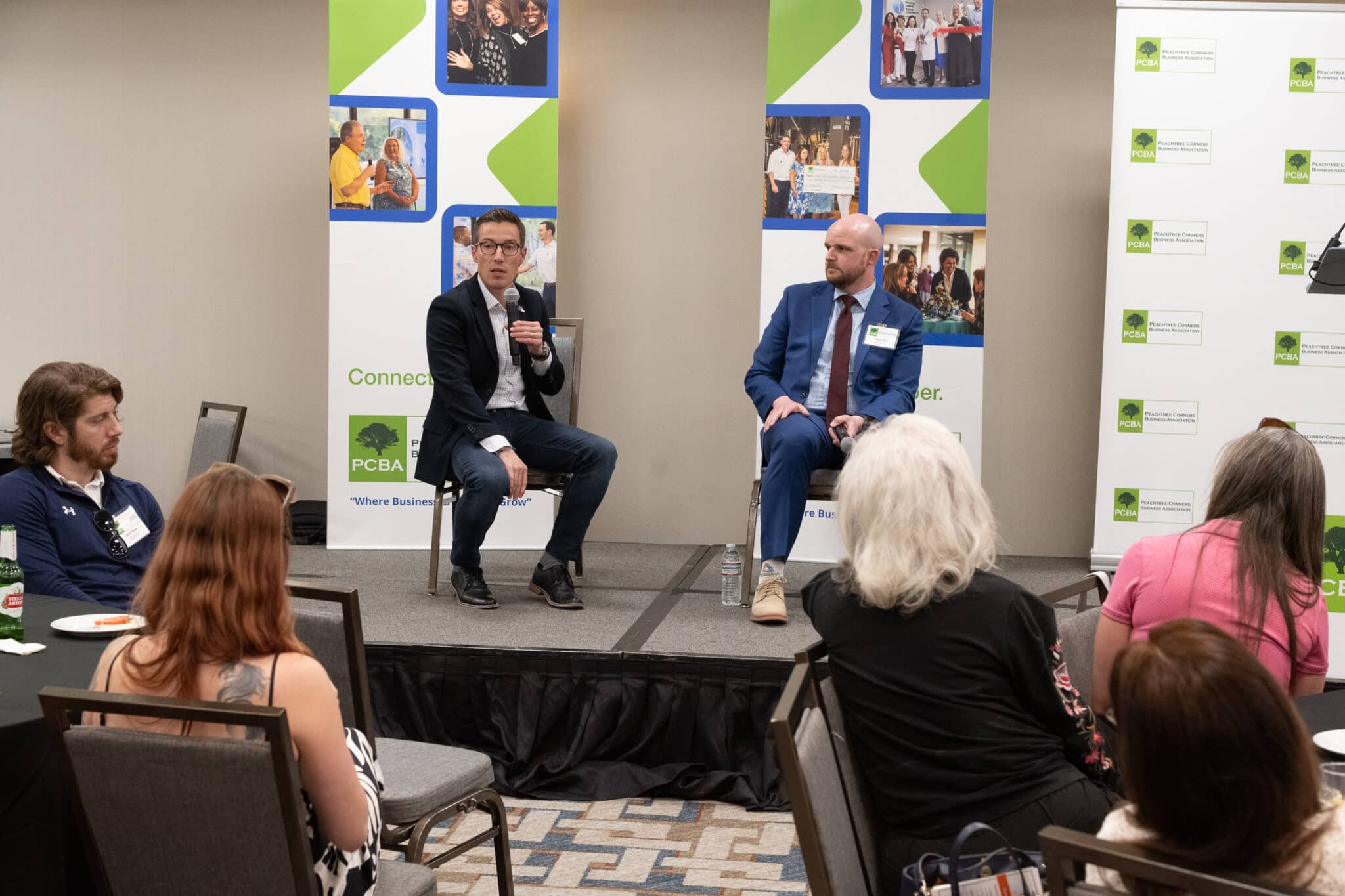
Most residents and business owners in Peachtree Corners probably think they know all about the economic development and strategic planning of Peachtree Corners, but do they really?
Peachtree Corners Business Association invited Peachtree Corners Economic Development Director Betrand Lapoire and Partnership Gwinnett Director of Economic Development Andrew Hickey to its After Hours Speaker Series on March 27 to discuss the city’s growth from a 1971 master plan to a bustling city with 42,000 inhabitants and 40,000 jobs.
Key points included the importance of business retention and expansion, with 24 projects last year creating 1,600 retained jobs, 1,600 new jobs and $250 million in new capital investment.
The Curiosity Lab, a world-class innovation center, was emphasized as a significant attraction. The city’s zoning and infrastructure plans were also discussed, focusing on balancing office and residential development to maintain a vibrant, sustainable community.
Matching jobs to residents
Although Peachtree Corners is just a teenager in terms of being an incorporated city, the foundation for this vibrant, fast-paced economic hub was laid more than 50 years ago by technology pioneer Paul Duke.
“Peachtree Corners was the first master-planned, business innovation technology park in metro Atlanta,” said Lapoire. “It was in response to the brain drain of technology with Georgia Tech graduates leaving the area.”
While the city may have a small-town feel, it’s the largest in Gwinnett County by population, but not land mass, he added.

“The city started from a commercial, industrial, R&D base and then was expanded around it,” said Lapoire.
Though home to more than 42,000 residents, most of the jobs in Peachtree Corners are filled by people who live outside the city, he added.
“So we have this interesting mismatch, in a way, although not unusual,” said LaPoire. That creates traffic and transit issues. So that means that one of the solutions is to create more jobs here to fit the profile of the community.”
He presented charts that show professional services, consulting and engineering as the largest job categories. The next tier of businesses are wholesale and manufacturing.
“So we have a good mix of industry,” he said.
A five-year plan
The city has a five-year economic development plan (2023-2028) that outlines strategies for attracting and retaining businesses, with education and workforce development being key components.
Partnership Gwinnett has similar goals as Peachtree Corners, but on a larger scale.
“We are the county’s sales and marketing arm for all 17 cities now, and we receive funding from both municipal sources as well as existing businesses here — both in Gwinnett and outside of Gwinnett as well,” said Hickey.
He shared how Partnership Gwinnett is designed to drive a lot of major corporations toward doing business inside and with Gwinnett County.
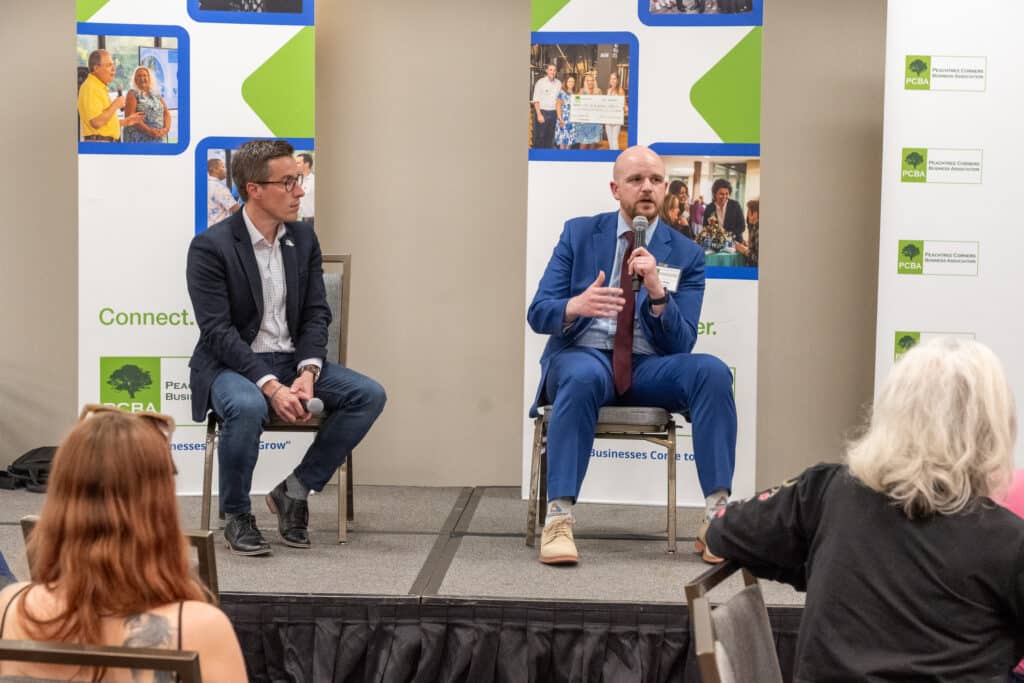
“One of the biggest things that we talk about that I’m sure it seems like most of us here, if you live here, you work here, you understand it. It’s the diversity that exists here in Gwinnett,” he said. “With a diversity index of 85, that means if we walk out of the Hilton here and we say hello to somebody, there’s an 85% chance they’re from a different ethnic or cultural background than ourselves, which to you and I may seem normal because that’s the life that we live in.”
He added that for companies, there’s a tremendous value in that, whether they have stated values, or they’re just making hiring decisions to get a wide range of candidates to fill those roles. Additionally, because of the proximity to Atlanta, Gwinnett County has a great labor draw.
Partnership Gwinnett
Partnership Gwinnett plays a significant role in recruiting businesses, expanding existing companies and developing the workforce. Hickey showed how the organization was involved with more than 24 projects last year.
“A majority of those were expansions, and that is a common thread you’ll see in economic development,” he said. “In business retention, expansion is so vital to working with our existing companies to make sure that they have the resources they need.”
He added that’s what leads to new investment and job creation in the community.
The organization also focuses on redevelopment projects, working with cities and the county to improve infrastructure and community amenities — especially strong educational institutions such Georgia Gwinnett College, Philadelphia College of Osteopathic Medicine and others.
Quality of life
In closing, both men stressed the importance of recruiting companies and developing the workforce, along with one aspect that means a lot but may not be as obvious — quality of life.
“It’s definitely evident that people like to work where they live — the whole live, work play experience,” said Hickey. “I joke that the part that people really have the most questions about, and are most excited to learn about, is new events at The Forum or Gwinnett Place Mall.”
Although they want to know what’s the next major company coming to Gwinnett, people REALLY want to know about how to spend their leisure time.
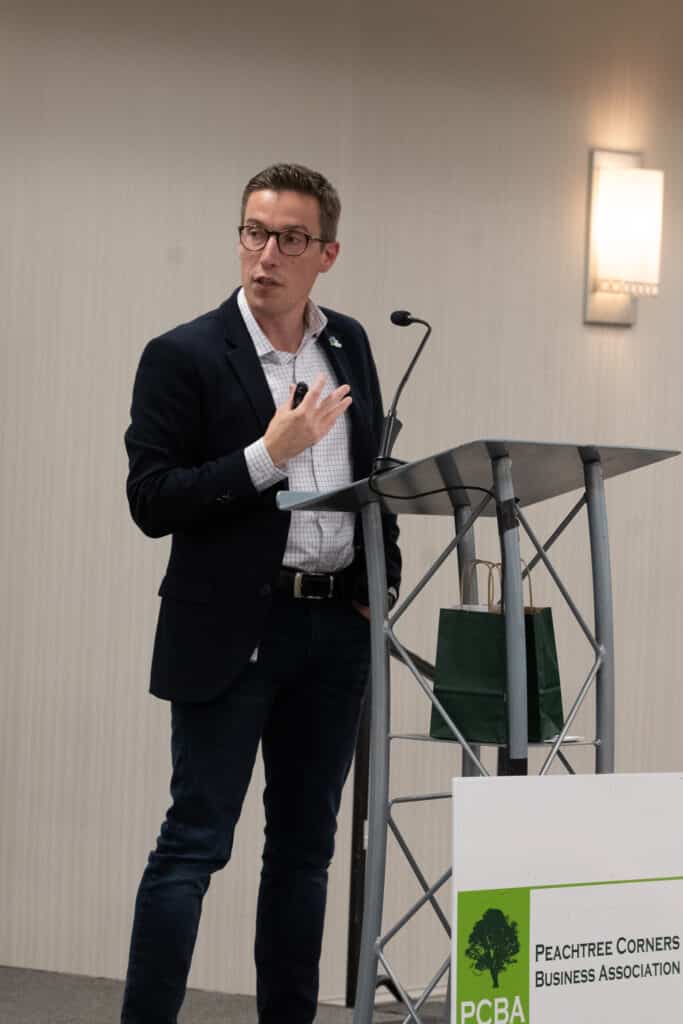
“That speaks to the importance of ensuring that we have a great community,” he said. “So at Partnership Gwinnett we work with all of our cities, and the county government as well, [on] a kind of a best-practices trip.”
He added that the peer tour allows everyone to know what the neighboring communities are doing and share the good news.
“We will take all of these elected officials, but also city staff, to different cities across the Southeast,” he said. “Last year, I believe they went to Huntsville, and have been to Greenville, Chattanooga — all cities that have done some really cool redevelopments that have taken their city to the next level. Our goal is to learn from them.”
Related
Business
Two Peachtree Corners Business Leaders Named Finalists for EY Entrepreneur Award
Published
3 weeks agoon
April 23, 2025
Ernst & Young’s Entrepreneur Of The Year celebrates ambitious entrepreneurs who are shaping the future
Ernst & Young LLP (EY US) recently announced the finalists for the prestigious Entrepreneur Of The Year 2025 Southeast Award, and two local, Peachtree Corners business leaders — David Quirk, president and CEO of DLB Associates Consulting Engineers PC and Erin Hanson, founder and CEO of Guardian Sports — made the list.
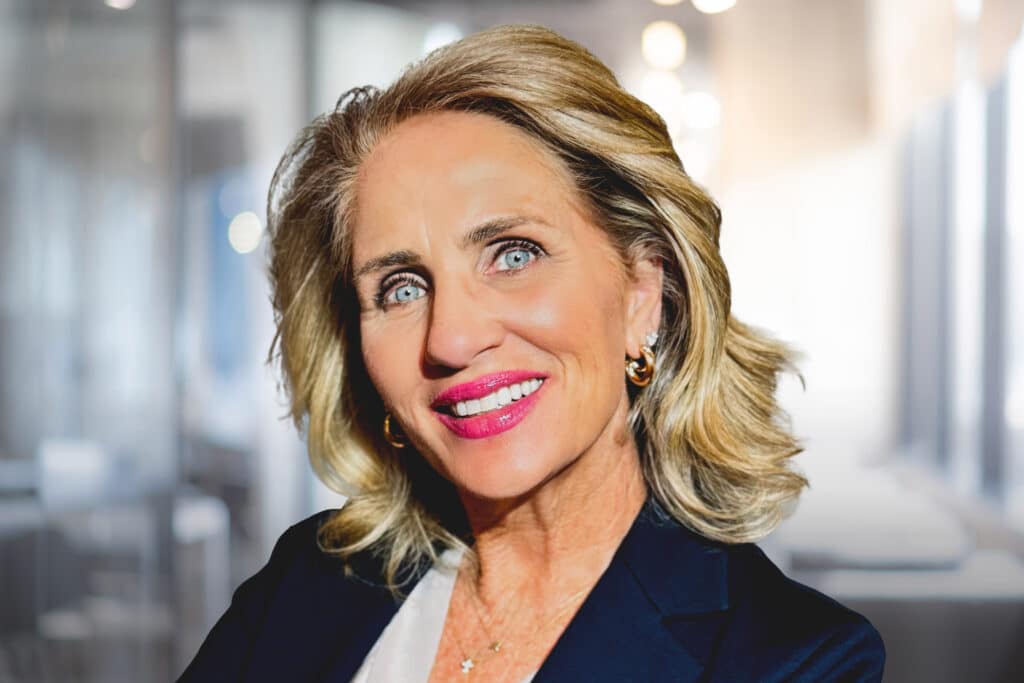
Hanson’s Guardian Sports is a family-owned company dedicated to serving athletes through safety and performance improvements in sports equipment. Major products include the Guardian Cap, PEARL ball and Guardian Infill serving the sports industry.

DLB Associates is a U.S.-based consulting engineering firm specializing in mission-critical and complex built environments. With more than 40 years of expertise, DLB delivers innovative, technology-driven solutions in engineering, commissioning and operations worldwide.
Celebrating entrepreneurial leaders
Now in its 40th year, Entrepreneur Of The Year recognizes the bold leaders who disrupt markets through the world’s most ground-breaking companies, revolutionizing industries and making a profound impact on communities. The program honors those entrepreneurs whose innovations shape the future and pave the way for a thriving economy and a hopeful tomorrow.
The Southeast program celebrates entrepreneurs from Alabama, Georgia, North Carolina, South Carolina and Tennessee.
An independent panel of judges selected 36 finalists for their entrepreneurial spirit, purpose, growth and lasting impact in building long-term value.
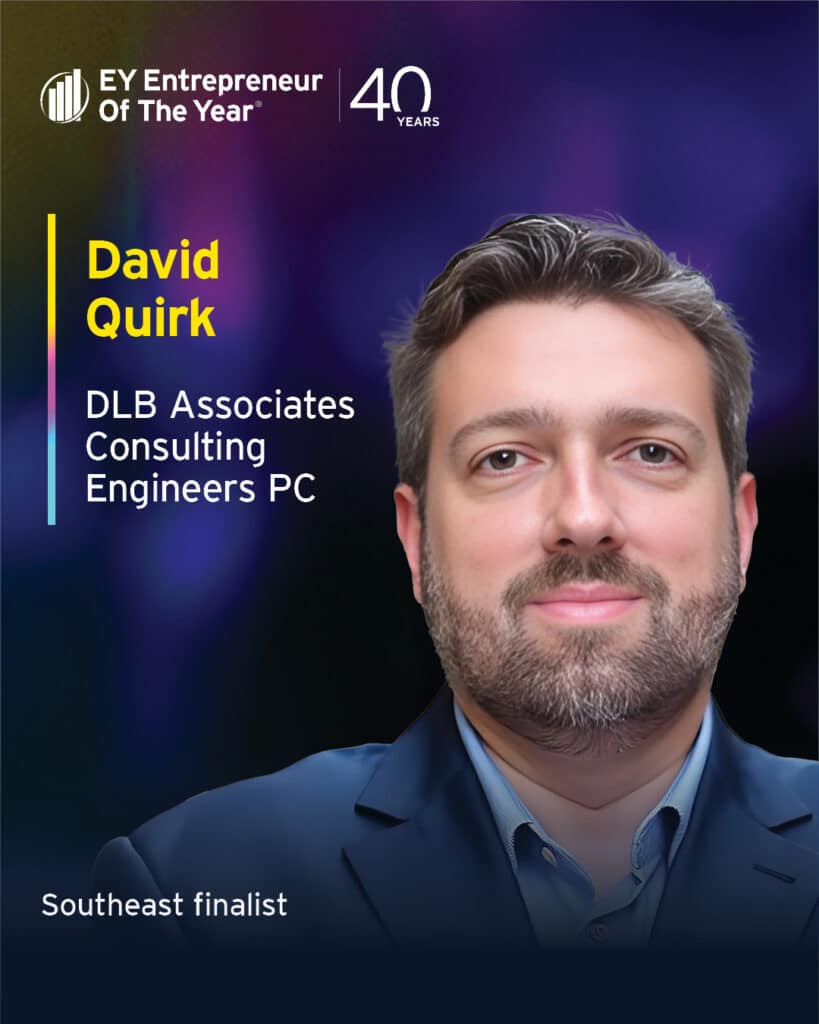

“This year’s finalists are leading examples of innovation, perseverance and resilience, illuminating paths to a brighter future for their industries and communities,” said Chevy Arnold, Entrepreneur Of The Year Southeast Program co-director.
“Their commitment to excellence transforms challenges into opportunities, inspiring us all,” added Kimberly Kicklighter, Entrepreneur Of The Year Southeast Program co-director.
Entrepreneur Of The Year honors many different types of business leaders for their ingenuity, courage and entrepreneurial spirit.
The program showcases original founders who bootstrapped their business from inception or who raised outside capital to grow their company; transformational CEOs who infused innovation into an existing organization to catapult its trajectory; and multigenerational family business leaders who reimagined a legacy business model to strengthen it for the future.
Including Quirk and Hanson, the 2025 Southeast finalists are:
- Marc Hodulich | 29029 | Atlanta, Georgia
- Damon Stafford | Alpine Intel | Charlotte, North Carolina
- Lou Hensley | Aspida | Durham, North Carolina
- Matthew Dent | Buffalo Rock Company | Birmingham, Alabama
- Melanie Little | Colonial Pipeline Company | Alpharetta, Georgia
- Will Bartholomew | D1 Training | Franklin, Tennessee
- Rene Diaz | Diaz Foods | Atlanta, Georgia
- David Quirk | DLB Associates Consulting Engineers PC | Peachtree Corners, Georgia
- Markus Scott | EyeQ Monitoring | Atlanta, Georgia
- Jon Gosier | FilmHedge | Atlanta, Georgia
- John Fitzpatrick | Force Marketing | Atlanta, Georgia
- Dr. Barry Patel | Galt Companies | Atlanta, Georgia
- Dr. Wade Smith | Galt Companies | Atlanta, Georgia
- Charles Gillespie | Gambling.com Group | Charlotte, North Carolina
- Kevin McCrystle | Gambling.com Group | Charlotte, North Carolina
- Mike Griffin | Griffin Brothers Companies | Cornelius, North Carolina
- Erin Hanson | Guardian Sports | Peachtree Corners, Georgia
- Dan Beem | Hissho Sushi | Charlotte, North Carolina
- Aaron Siegel | Home Team BBQ | Charleston, South Carolina
- Marc Murphy | Ignite Digital Services | Charleston, South Carolina
- Miller Chalk | Inglett & Stubbs, LLC | Mableton, Georgia
- Liza Rodewald | Instant Teams | Southern Pines, North Carolina
- Stephen Andresen | McClancy Foods & Flavors | Fort Mill, South Carolina
- Travis LeFever | Mission Mobile Medical Group | Greensboro, North Carolina
- Cyrus Mojdehi | Northway Homes | Charlotte, North Carolina
- Connor Ryan | NutraSky | Alpharetta, Georgia
- Fritz Owens | OTR Solutions | Roswell, Georgia
- Christopher Chuang | Relay, Inc. | Raleigh, North Carolina
- Kurt Jacobus | restor3d, Inc. | Durham, North Carolina
- Tom Kendrot | Shearwater Health | Nashville, Tennessee
- Teak Shore | Southern Lighting Source | Cumberland, Georgia
- Cindy Eckert | Sprout Pharmaceuticals | Raleigh, North Carolina
- Bryan Moore | TalkShopLive Inc. | Nashville, Tennessee
- Tina Moore | TalkShopLive Inc. | Nashville, Tennessee
- Igor Marinelli | Tractian | Atlanta, Georgia
- Joan Butters | Xsolis | Franklin, Tennessee
You can learn more about the finalists at ey.com/en_us/entrepreneur-of-the-year-us/southeast/winners-finalists.
Regional award winners will be announced on June 25 during a special celebration. The winners will then be considered by the national independent panel of judges for the Entrepreneur Of The Year National Awards, which will be presented in November at the annual Strategic Growth Forum®, one of the nation’s most prestigious gatherings of high-growth, market-leading companies.

About Entrepreneur Of The Year
Founded in 1986, Entrepreneur Of The Year has celebrated more than 11,000 ambitious visionaries who are leading successful, dynamic businesses in the U.S., and it has since expanded to nearly 60 countries globally.
The U.S. program consists of 17 regional programs whose panels of independent judges select the regional award winners every June. Those winners compete for national recognition at the Strategic Growth Forum® in November where national finalists and award winners are announced.
The overall national winner represents the U.S. at the EY World Entrepreneur Of The Year™ competition.
For more about the award, visit ey.com/us/eoy.
Related
Business
SCB Construction Group Partners with CGA Reps on New Peachtree Corners HQ
Published
4 weeks agoon
April 15, 2025
SCB Construction Group, freshly rebranded from SteelCo, secures construction project with CGA Reps for new office HQ in Peachtree Corners
SCB Construction Group has announced a strategic partnership with CGA Reps to build a new office headquarters in Peachtree Corners. The project, encompassing approximately 26,000 square feet of innovative workspace, marks a significant milestone in advancing CGA Reps’ corporate vision while showcasing SBA Construction Group’s commitment to delivering transformative construction solutions.
In collaboration with Oakley Real Estate Partners — serving as developers of the project on behalf of CGA Reps — this venture reflects a united effort to bring cutting-edge design (from Smallwood architecture firm) and operational excellence to the commercial kitchen equipment industry.
The announcement follows several high-profile projects for SCB Construction Group in 2024, including a 72,500-square-foot manufacturing center and headquarters for Process Equipment & Controls, an impressive interior build-out for Courtesy Ford Conyers’ commercial service center and the Phase 1 completion for StoreEase Loganville — recently honored as a 2024 Smart Facility of the Year by Modern Storage Media.
A bold new chapter for CGA Reps
The new 25,890-square-foot headquarters is designed to be more than just a workplace — it is envisioned as an inspiring environment that serves both client engagements and employee creativity. CGA Reps is recognized as an industry expert in commercial kitchen equipment, representing leading manufacturers, warehousing, distributing and installing everything from fryers to commercial walk-in freezers.
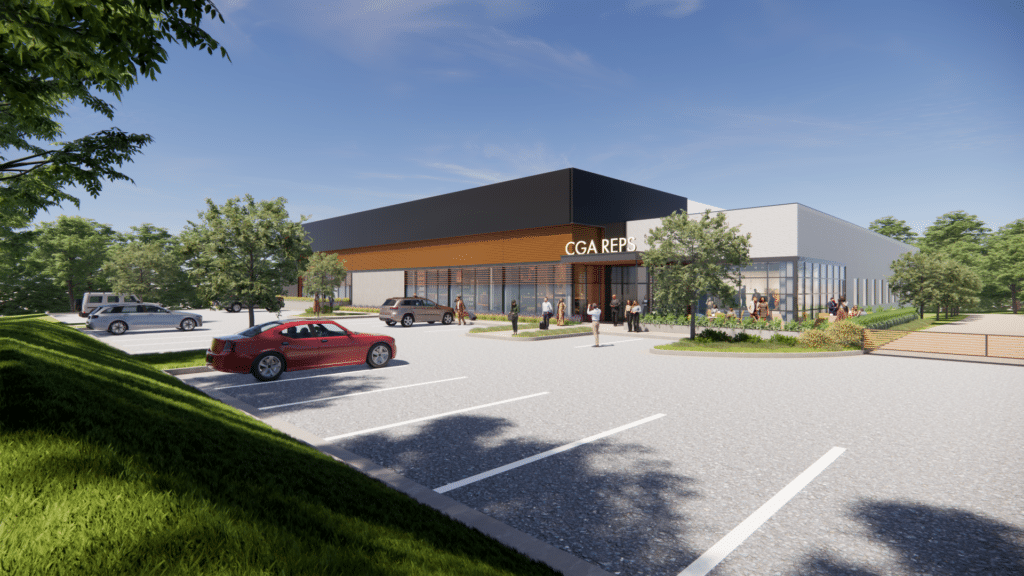
The facility’s design reflects this expertise, featuring a dedicated approximately 9,000-square-foot showroom kitchen that will host equipment demonstrations, tradeshows and webinars. This dynamic space will allow CGA Reps to showcase its comprehensive product range and provide clients with hands-on experiences of the latest commercial kitchen innovations.
A standout feature of the project is its innovative approach to stormwater management. With the site comprising only three acres, sufficient space for a traditional detention pond does not exist. To overcome this challenge, the design includes an underground detention system located beneath the truck court to efficiently handle all stormwater runoff.
This solution not only maximizes the use of the available land but also reinforces CGA Reps’ commitment to sustainable practices.
“We are excited to embark on this project with CGA Reps,” said Jay Bailey, CEO of SCB Construction Group. “This partnership underscores our commitment to customer excellence in design and construction, and it is a testament to the trust our clients place in our ability to deliver projects that not only meet but exceed expectations.”
Delivering excellence through proven expertise
SCB Construction Group’s track record in 2024 has been nothing short of remarkable. Earlier in the year, the company completed a 72,500 square foot manufacturing center for Process Equipment & Controls, integrating office space within a dynamic production facility.
This project was celebrated for its innovative design that balanced operational efficiency with a modern aesthetic, utilizing IMP panels to mimic tilt-up concrete, setting new standards for manufacturing environments.
Similarly, the interior build-out for Courtesy Ford Conyers’ commercial service center demonstrated SCB Construction Group’s ability to transform conventional spaces into functional and attractive environments that cater to both customer and staff needs.
The company’s commitment to quality and precision was again evident in the successful Phase 1 completion for StoreEase Loganville. This project, which recently earned the distinction of a 2024 Smart Facility of the Year by Modern Storage Media, highlights SCB Construction Group’s forward-thinking approach to construction and design, incorporating smart technologies and design that enhance sustainability and operational efficiency.
A rebranding that reflects a vision for the future
In a move that signals its evolution and growth, SCB Construction Group has recently rebranded from its former identity, SteelCo Buildings, as it spins off its construction division. This strategic rebranding is not merely cosmetic — it represents a renewed commitment to capabilities, credibility and client-focused service.
The refreshed brand is anchored by a new tagline “Deep Expertise, High Expectations” and a clear brand promise that communicates the company’s mission: to craft exceptional construction experiences based on precision, innovation and trust.
“Our rebranding is about more than just a new name or logo; it’s a renewed promise to our clients and communities,” explained Robert Lee, marketing director at SCB Construction Group. “We believe that our updated brand identity, including our invigorated tagline and mission statement, encapsulates our dedication to pushing the boundaries of design and construction. It reflects our commitment to creating spaces that are as inspiring as they are functional.”
Transforming spaces to inspire and connect
The new headquarters for CGA Reps is expected to become a landmark facility in Peachtree Corners. Beyond its impressive architectural design and advanced construction techniques, the building is planned as a hub for innovation and collaboration.
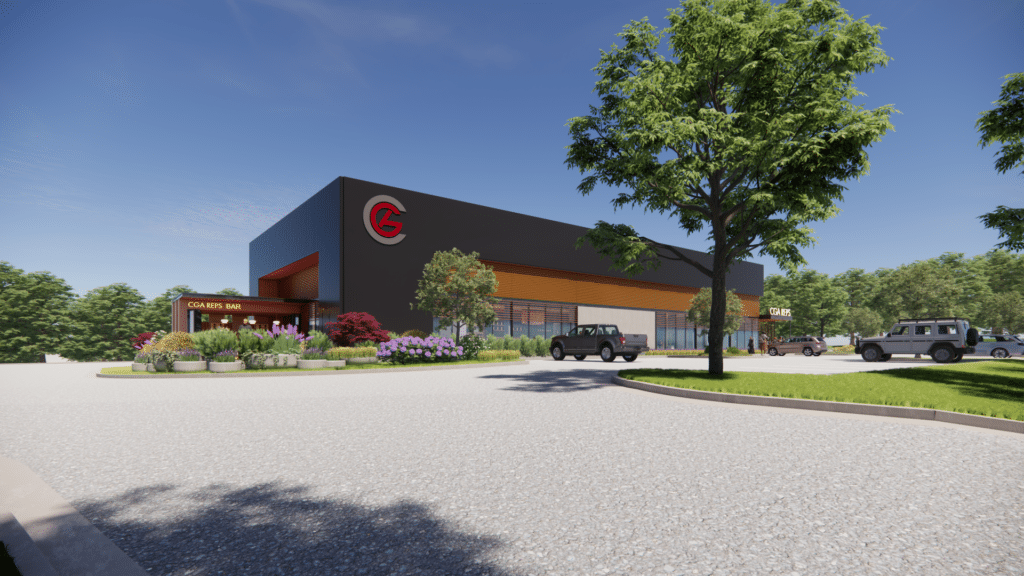
The interior build-out will include dynamic client reception areas, interactive meeting rooms, and dedicated spaces designed to foster creativity and teamwork among employees. The layout is crafted to ensure that every area of the facility contributes to a productive and inspiring work environment.
“By investing in this state-of-the-art facility, CGA Reps is making a strong statement about the future of work,” said Bryan Young, VP of construction at SCB Construction Group. “Our team is dedicated to designing and building spaces that not only serve the immediate needs of our clients but also create environments that motivate and inspire. The new headquarters will be a testament to that vision.”
Looking ahead
The partnership between SCB Construction Group and CGA Reps marks a significant step forward for both companies. As SCB Construction Group continues to build on its legacy of excellence and innovation, this project is poised to set a new benchmark for modern office headquarters design in the region.
With a strategic focus on creating spaces that inspire, connect and drive success, the future looks promising for both SCB Construction Group and its esteemed partner, CGA Reps.
For more information on the new headquarters project or to learn more about SCB Construction Group’s portfolio, visit scbcg.com.
Related
Read the Digital Edition
Subscribe
Keep Up With Peachtree Corners News
Join our mailing list to receive the latest news and updates from our team.
You have Successfully Subscribed!

Katherine Lafourcade — A Journey of Passion, Resilience and Giving Back

Digital Edition

PCBA Announces 2025 Scholarship Winner

Official City Merchandise Line Debuts This Saturday at Town Green

Paul Duke STEM High School Student Earns CGO Scholarship

World Blood Donor Day Starts Here: Theo’s Miracle, Katherine’s Mission [Podcast]

Executive Function: A Tribute to Working Moms

Peachtree Corners Grows Business Opportunities Through Economic Development

Peachtree Corners Hosts Discussion About the Future of Local Policing

City of Peachtree Corners Awarded Certificate of Achievement From GFOA for Seventh Straight Year

Simpson Elementary Marks Exceptional Children’s Week

Executive Function: A Tribute to Working Moms

Official City Merchandise Line Debuts This Saturday at Town Green

Peachtree Corners Grows Business Opportunities Through Economic Development

Digital Edition

World Blood Donor Day Starts Here: Theo’s Miracle, Katherine’s Mission [Podcast]

Light up the Corners [Video]

Capitalist Sage: Business Leadership in Your Community [Podcast]

Cliff Bramble: A Culinary Adventure through Italy

Top 10 Brunch Places in Gwinnett County

A Hunger for Hospitality

THE CORNERS EPISODE 3 – BLAXICAN PART 1

Top 10 Indoor Things To Do This Winter

The ED Hour: What it takes to Remove Barriers from Education





